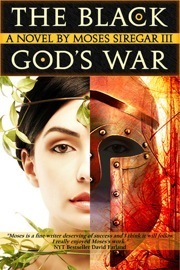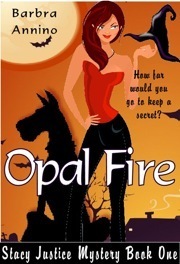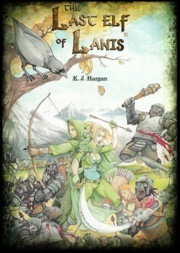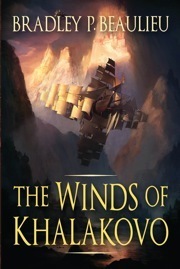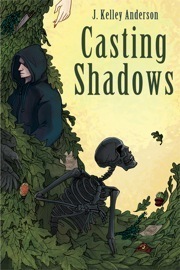Lindsay Buroker's Blog: Lindsay Buroker, page 35
April 6, 2012
Emperor's Edge 4 (Conspiracy) Update and FAQ
I've had quite a few people asking when EE4 (Conspiracy) will be out, so I thought I'd do a quick post to answer that and other common questions (and, by the way, thank you for caring enough to email and ask!).
First off, I just finished the core editing of the manuscript and sent the last third off to beta readers. Once I get their comments back and have tweaked the story to my satisfaction, I'll send the file off to my editor for proofreading (I'll also be sending copies out to the folks who donated to my Kickstarter campaign at this time). I'm guessing that'll be in the third or fourth week of April. My goal is to have Conspiracy live on Amazon, B&N, etc. in the first week of May.
Here are answers to other questions I've been getting:
Who will be the secondary POV character in EE4?
Akstyr. The plan is do to Maldynado in the fifth book and Sicarius in the sixth.
How many books total will there be?
I plan to wrap up the current storyline by the end of the sixth book. After that, we'll see. I have another project I want to move onto, and I'd like to do a sequel to Encrypted eventually, but if people want more books with Amaranthe, Sicarius, and the gang (if they all survive, muahaha!), I might be open to doing further adventures at some point. I enjoy writing these guys. 
You've been working on Book 4 FOREVER — how long is it?
Okay, nobody said forever (hey, I just published Book 3 in November), but it does feel like I've been working on 4 for a while. As I said on Twitter, it's not a Robert-Jordan-length chihuahua killer, but it's a good 10,000 words longer than the earlier books, or 125,000 total (though I might snip a few more words in the last editing pass).
When are Books 5 and 6 coming out?
Yes, some eager beaver asked. I'm not sure, but I will start in on Book 5 as soon as I'm done editing 4, and I probably won't take breaks in between to work on anything else (unless I start going crazy and need a change). The last three EE books are going to be a trilogy of sorts, all part of one bigger story arc, so I want to get them out in a timely manner (so nobody comes after me with torches and pitchforks!).
That's it for now. I'll post the cover art soon. If you have any other questions, feel free to ask below. Thanks!
Related Posts:
Dark Currents Audiobook Released at Podiobooks
Cover Art for The Assassin's Curse (a Sicarius and Amaranthe short story)
Fantasy Music from Around the Web
April 4, 2012
Serial Books Selling Like Hotcakes for Indie Author Brondt Kamffer
Early on in my e-publishing career (ya know, last year), I realized there was no reason to limit oneself to full-length novels when it comes to ebooks. In the print world, the economics of book binding might dictate that stories need to be at least 60,000 words long to make sense, but in the digital world… they can be any length at all. Because of that, I e-published some of my short stories and started a series of novellas, but one thing I haven't experimented with (yet) is serialization. That may change one day, as quite a few authors are giving it a try, and it's working well.
A couple of months ago, indie fantasy author Gregory J. Downs gave us a guest post on Finding Success with Serialized Ebooks. Today, we have a great interview with W. Brondt Kamffer, another fantasy author who's hitting the best-seller lists with his serialized story. I've known Brondt through Twitter and his blog for about a year, and I've watched him try to find the magic bullet of book promotion that would increase his sales. It didn't seem to be happening with his first series, but I checked the fantasy Top 100 at Amazon the other day and noticed his new ebooks were all over it! Here's the story of how he's made that happen…
Interview with W. Brondt Kamffer
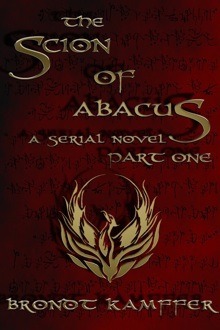 You've been e-publishing for a year or two now, I believe, and have a few books out there, but it's your new series that's really taken off. Do you want to tell us about your books and what you're doing differently this time around?
You've been e-publishing for a year or two now, I believe, and have a few books out there, but it's your new series that's really taken off. Do you want to tell us about your books and what you're doing differently this time around?
Thanks for the public forum, Lindsay, to share my journey. I've just passed my first anniversary as an indie author. 2011 was a very rocky road for me, very discouraging on the whole. I released three full-length novels between April and July and did all the required promoting that came with choosing to self-pub, but I never saw more than a dozen to a score sales in a month. I had an active blog, a podcast targeted to a fantasy audience, an active Twitter account, ads on Goodreads, a free novella on Amazon. None of it was doing a thing to shift books; not even the freebie!
In September I began writing the book that would eventually become The Scion of Abacus with the intent to publish the story in two parts, split evenly down the middle, at about 105,000 words a piece. And then I read about the success that Gregory Downs was having, as well as Sean Platt and David Wright. The thing these writers had in common was that they had chosen to publish their novels as serials. This got me thinking.
I was very busy teaching in the Fall of 2011, and so I made slow progress on my own novel, slow enough that I had plenty of time to think about splitting the story from a duology into a six-part serial. I figured that since nothing else I'd tried had worked thus far, I would give the serial format a shot, hoping that the regular release schedule offered by shorter volumes might generate some interest.
I was tired of and burnt out on Twitter. I'd slowed down on my blog and podcast. I'd long since given up any form of paid advertizing. All I had were plans for a serial and a feeling that I'd simply go ahead and see what would happen.
As expected, month one, with only one volume out, was slow, with maybe ten copies selling. Month two saw some increase in sales with two volumes and some KDP free days, up to about 300 copies sold. But the real kick off came at the release of volume three. My previous novels had seldom delved below the 50,000 rank on Amazon. With the release of volume three of The Scion of Abacus, the serial began to live in the sub-30,000 zone. And then sub-20,000. And then sub-10,000. When volume one hit 5,000, I couldn't believe my eyes.
And then I released part four. The series' sales had accumulated in some sort of snowball effect, all without a single ounce of marketing. No Twitter announcements. No ads. No posts on Kindleboards. I signed up for KDP Select, and I think that helped a little, but downloads on free days never totaled more than about 200 a day. Now, I'm selling many more books than that in a day. It was a gamble born out of frustration, and like many before, I seem to have gotten lucky at last.
What made you decide to serialize your latest book? Do you want to talk a bit about length and how you're breaking things up? Are you leaving people hanging with cliffhangers?
As mentioned, I'd read about the success a couple of authors were having with the format. I was frustrated at seeing no success with my previous books, and so I decided to try something radically different.
The structure of my story lent itself nicely to a six-part division. I had in mind a single novel in two volumes with a standard three-part structure for each part. Interestingly, the moment I decided to go with six volumes, the divisions presented themselves immediately. There are cliff-hangers, but in many ways each volume stands alone at the same time as being intricately connected to the previous and following ones. This is, after all, really still a single long novel. This allows me to control revelations in a timely manner, giving the reader enough information to want to read the next volume while at the same time providing a complete mini story arc per volume.
As soon as I decided where the divisions would go, I realized that each volume would be close in length. It took a little bit of rewriting to get volumes to near-identical lengths, a commitment I made to myself and future, hypothetical readers as I did not wish any volume to seem lighter than the rest—ironically, all bad reviews either on Amazon or by email have complained about volumes getting shorter, when in reality they have been getting longer. The story must getting better the deeper things get!
So each volume turns in at about 35,000 words, which, depending on your Word font, is 100 to 140 pages, a nice and hefty chunk of story every month. Oh yeah, the other thing folks complain about—and was anticipated—is having to wait four weeks for the next installment, but I take that as a good complaint to receive!
Would you like to talk about your pricing strategy? It looks like you've made the first part of the series free at Amazon and others are 99 cents and 1.99.
I thought about this one for a long time. I decided on 99c initially because I thought that was all I should charge for what was essentially an incomplete portion of a whole. An early reader emailed me, when only volume one was out, to say he'd be willing to pay more per volume. This was encouraging, but I was hardly ready to change things up. I made the final decision to charge more for volumes four through six only after part one had cracked rank 5,000 on Amazon. I figured that folks might be willing to pay more to see the end of the story.
Some folks have not reacted well to the decision, but as soon as I've explained that the length (well over 200,000 words) is roughly that of two novels and that $4.50 is not so unreasonable for a novel [(99x3)+(1.99x3)=8.94/2=$4.47], those complaints have generally melted away. I have enrolled the individual volumes in KDP Select to make books free on occasion, but I've used the program sparingly after the first two months, as I was not getting much in the way of downloads.
I remain slightly unsettled about my pricing strategy, knowing that I am inviting criticism, but it seems not to have affected sales at all, as part four sells equally as well as parts two and three, which are a little bit behind the first volume overall.
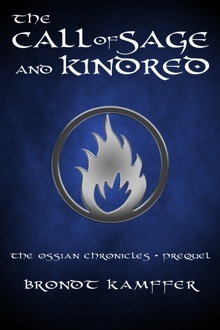 You have simple but striking cover art for The Scion of Abacus series (and I notice you've redone your old covers too). Do you think that's played a role in your success?
You have simple but striking cover art for The Scion of Abacus series (and I notice you've redone your old covers too). Do you think that's played a role in your success?
It is possible. I changed the covers of the old books to coincide with the release of The Scion of Abacus, opting for a more stylized cover art. I design my own covers, so I had to really think long and hard, playing around with various effects, looking at popular novels, etc. I have never entirely bought the argument that a good cover is essential, though, as I have seen some pretty horrendous covers on best-selling indie novels. That being said, I certainly don't think the covers have hurt. Perhaps they are part of the overall formula that found success.
Are you planning to release an omnibus edition of the series once all the smaller pieces are published? Any thoughts on how you'll price that?
I do plan to release an omnibus, and I am even contemplating using Createspace to make hard copies available too, though I'm undecided at this point. Regarding price, I am still mulling this one over, as I'd like to come up with a price incentive to buy the omnibus over the individual volumes. Your author audience with understand the financial concerns here, as I need to balance price for the consumer with royalties earned. The good thing about the state of indie publishing is the ease with which an author can change the price of his or her books. If whatever I decide to charge initially fails to shift volumes, I can always experiment with lower price points.
Lastly, would you like to talk about future projects or is there anything else you'd like to share with readers?
Given the success I've met with the serial format, I am planning on my next project to be in a similar vein, though not identical. I have plotted out what I'm calling a trilogy of trilogies. Essentially, I plan three long novels each about the size of The Scion of Abacus, each of which I will write in three distinct and smaller parts, bringing the final count to a total of nine shorter volumes. Volumes will necessarily be longer than the current 35,000 but a great deal shorter than the standard 100,000.
But, at the end of the day, it all comes down to two things, as I see it: Regular releases keep your name in the readers' minds, and publishing really is a total crap shoot.
To the first I would say that I feel the serial model offers an interesting opportunity for success by creating regular releases for the audience. Your name never gets old and always shows up in the new releases section in the Kindle store. That being said, this is still no remedy for a poor story, and it does take some amount of planning and a lot of foresight to make it work. But regular seems to be a real key.
Regarding the second point, as I've said, I do no promotion anymore whatsoever. In fact, the moment I stopped promoting, I started selling better, and I'm pretty sure I was not one of those obnoxious self-pubbed types we all hear horror stories about. But the real point is this: If your books are not selling for whatever reason, don't be afraid to throw the baby out with the bathwater (yes, you read that right!) and opt for a completely different approach.
Thanks, Brondt! Best wishes for your continued success!
If you want to learn more about Brondt, or try his books, you can pick them at Amazon, or stop by his website for more information.


Related Posts:
Should an Indie (Self-Published) Author Create an Imprint (i.e. their own "press")?
Which Genres Sell Best for Indie Ebook Authors?
How to Improve Your Ebook Sales at Barnes & Noble, Smashwords, and iTunes
April 2, 2012
Are More Authors Than You Think Making a Living Self-Publishing?
About this time last year, I wrote up a blog post detailing how I was doing, financially speaking, on my new e-publishing endeavor (I got my start in December of 2010). When it came to ebook earnings, my grand total for March of 2011 was $724. At the time, I had two novels out, a couple of 99-cent short story collections, and the first Flash Gold novella (it, and my first Emperor's Edge novel, are free in case you haven't checked out my work yet and are dying to do so).
I didn't think that $700 was too shabby considering I hadn't been at the e-publishing thing for long. But when you look at how much time I was spending on promotion and writing, it wasn't exactly a huge income either.
A year later, though, things have continued to pick up steam. I have two more novels out, two more novellas, and a new stand-alone short story. In March of 2012, I sold more than 4,000 ebooks, not including downloads of the freebies, and will earn over $5,000 (my ebooks range from 99 cents to $4.95).
Those are estimates, since the month just ended, and Smashwords can't offer real-time reports from their partner sites (I've been selling decently at iTunes, in particular, since I made my first novel free over there), but I'm tickled with the growth in sales (and readers!) over the last year. I decided to officially make this "the day job" in December, though I'd been neglecting the old day job and writing and promoting nearly full-time long before.
I'm sure my earnings will continue to go up and down (as you'd expect, one tends to do best in the months that new releases come out), but I'm happy that, thanks to the current e-publishing paradigm, making a living as a self-published author (and not a best-selling one at that) is viable.
Who else is making a living self-publishing?
As I mentioned, I'm not a huge seller compared to some (for most of March, my non-free novels weren't even in the Top 100 of their sub-categories at Amazon), so I know there are a lot of indie authors making good money right now. Of course, we've all heard of JA Konrath and John Locke, but I promise you many others are earning $X,XXX to $XX,XXX a month.
If you browse the indie authors in your favorite Amazon Top 100 category and find some with multiple ebooks in there, especially multiple ebooks priced at $2.99 or above, you can bet they're doing well.
What impresses me is just how many indie authors are in there, going neck-a-neck with well-established Big 6 authors. That we're able to sell our books less expensively certainly doesn't hurt, but the big boys don't have as many advantages in online stores as they do in brick-and-mortar establishments. Publishers can't buy table space or display stands at the front of the store, and Amazon's algorithms well help anyone who's selling well, regardless of publisher (the more books you sell, the more often Amazon automatically recommends those books to readers who enjoy your genre).
Here are a few authors in my genre (fantasy) that are doing well now and have been for a while (links go to their author pages at Amazon, so you check out their books):
David Dalglish
Daniel Arenson
Aaron Pogue
M. R. Mathias
B. V. Larson
Secrets to self-publishing success?
Now that you've taken a peek at some of those successful indie authors, let's see what common things they're all doing. The web is full of advice from book-promotion gurus, but, in the end, it probably makes most sense to simply see what successful people in your niche/genre are doing and emulate them. The folks I listed up above are all selling better than I am, and I'd guess most of them are in the midst of six-figure years.
So, what are the common threads?
Lots of books out — Careers aren't made on one or two books. Being prolific counts for a lot. At the risk of stating the obvious, the more books you have, the more books people can buy. If you're working your buns off on promotion, and you only have one book out, you're only going to be able to make 35 cents to a couple of dollars (depending on your book's price) from each customer. But, if you have an eight-book series, and that same customer you worked so hard to get enjoys your work enough to go on to buy all of them, the earnings potential is much higher. Also, more books means more ways for people to stumble across your work. (Note: Don't get bogged down thinking in terms of full-length novels — some people are having success serializing long books and others are doing novellas or shorter-than-average novels. With ebooks, there are no rules as to length.)
Professional cover art — There aren't too many best sellers out there with hokey cover art. It's odd that it matters so much with books — digital books at that — but cover art is what catches someone's eye in the Amazon listings and first gets them to click on a book to read the blurb.
Series, series, series — Most of these authors not only have a series, but they have multiple series going. You'll see that some of their series do a lot better than others — the more work you have out, the more likely it is that you'll have a book or series that takes off. And the advantage with writing in series format is that there are a lot of readers who enjoy following the same heroes for multiple books, to that extent that they'll automatically buy sequels, regardless of the premise (I'm one of those types of readers, so I definitely get that).
Free or 99-cent first books — These guys are all kicking off their series with inexpensive lead-ins. Speaking for myself, my overall sales went up significantly when I dropped my first Emperor's Edge book to free, at Apple and Barnes & Noble as well as Amazon. I thought it would be a temporary boost (I did this around Thanksgiving), but I've continued to do well with the second and third novels in that series.
Not big names in the blogosphere — Some of these guys don't blog at all and are practically non-existent on social media sites. I think a blog can help, and it's something I enjoy doing, but having a popular blog on writing or publishing won't necessarily make you a fiction best-seller. Getting more books out is probably more important than blogging regularly in the grand scheme of things.
Publish regularly — I'm sure some of these authors started out with a "trunk" novel or two, but if you look at their publication dates, you can see that they've all been putting new work out on a regular basis for the last couple of years. I've seen some authors work the system and get to the tops of the Top 100 lists only to gradually fade away into obscurity after a few months. The simple matter is that it's easier to stay on people's radars if you're putting out new stories every quarter or so (I can't write novels that fast, so this is one of the reasons I'm trying to work in novellas and short stories between bigger projects — that and because I like having multiple projects to work on at any given time!).
Does all this mean that there's no hope to make good money self-publishing if you can't put out a lot of books on a regular basis? No, I've come across people who are doing phenomenally with one book (this tends to happen more often in broad-appeal genres such as thrillers and romances rather than things like epic fantasy and science fiction), but I have found those folks to be the exception rather than the norm.
In the end, you have to find what works best for you, but I think it's important for one's sanity to make sure sales and financial goals make sense relative to the amount of work we're able to get out there. Expecting to knock it out of the park with one or two books is asking a lot. If it happens, great, but if it doesn't then that's okay too. You haven't set yourself up for disappointment by having unrealistic goals.
In the meantime, keep writing!
Related Posts:
Indie Writing and Traditional Storytelling with Alan Dean
What Can We Learn from JA Konrath's $140,000 E-Publishing Sales Month?
How Many People Can *Really* Make a Living Self-Publishing?
March 31, 2012
10 Free Fantasy Ebooks to Check out
You guys probably already know The Emperor's Edge is free at Amazon (and Barnes & Noble, iTunes, and Smashwords), but there are lots of other fantasy authors with free offerings right now too. You can browse the Top 100 Free Fantasy category at Amazon at any time, but I've picked out ten that have good reviews to get you started. They're a mix of epic fantasy and urban fantasy titles.
Note: The prices may change at any time; they're free as I write this post. Tomorrow may be a different story!
Note 2: These ebooks are free in the U.S. — if you're in another country, Amazon may have tacked 0n some fees. Since many of these are indie authors, you may be able to find the books at Smashwords as well (sans fees).
Free Fantasy Ebooks
The Black God's War (Splendor and Ruin, Book I)
Against the backdrop of epic warfare and the powers of ten mysterious gods, Lucia struggles to understand The Black One. Her father-king wants war. Her messianic brother wants peace. The black god wants his due. She suffers all the consequences. King Vieri is losing his war against the lands of Pawelon. Feeling abandoned by his god, he forces his son Caio, the kingdom's holy savior, to lead his army. Victory ought to come soon.
To counter Caio's powers, Pawelon's prince enters the conflict. Rao is a gifted sage, a master of spiritual laws. He joins the rajah to defend their citadel against the invaders. But Rao's ideals soon clash with his army's general. The Black One tortures Lucia nightly with visions promising another ten years of bloodshed. She can no longer tell the difference between the waking world and her nightmares. Lucia knows the black god too well. He entered her bed and dreams when she was ten. The Black One watches, waiting to see Lucia confront an impossible decision over the fates of two men–and two lands.
Opal Fire (A Reluctant Witch Mystery: Stacy Justice Book One)
Stacy Justice did not expect to be set on fire that night, but being raised by witches prepares one for life's little surprises. When her cousin is accused of arson, Stacy is determined to clear her family name–until something cryptic is discovered in the rubble that changes everything. Now, someone wants her dead and she finds herself dodging angry motorists, exploding chickens and a very creepy man lurking in the shadows. As she begins to dig up the past, Stacy learns that even those closest to her have something to hide–and she's about to discover a destiny she never imagined. Suddenly, she finds herself running from a killer that will stop at nothing to keep a secret.
Wealdland is being overrun by troops of vicious garonds, led by the 900 year old, evil lord of magic, Deifol Hroth. Humanity is on the brink of extinction. Iounelle, last of the elves, embarks on a dark journey of revenge for the eradication of her race by the garond army. One of the humans she rescues from the small village of Bittel knows how to find the sword of power, the Mattear Gram, the edge in the coming battle.
Now if they can only stay alive long enough to get it…
Debut novelist Beaulieu paints a detailed and realistic portrayal of individual fates bound up in social responsibilities as well-grounded cultures clash. Prince Nikandr Khalakovo, facing an arranged marriage, also suffers from a wasting disease plaguing the Anuskaya islands. When the rebellious Maharraht loose a fire elemental and kill the visiting Grand Duke Stasa Bolgravya, civil war erupts, and all factions seek to capture a mysterious autistic boy who straddles both the spirit and the material worlds. Beaulieu skillfully juggles elements borrowed from familiar cultures (primarily Russian and Bedouin) as well as telepathy, airborne ships, and magical gems. Viewpoint shifts are occasionally confusing, but the prose is often poetic—airborne skiffs under attack "dropped like kingfishers" and "twisted in the air like maple seeds"—and the characters have welcome depth.
Edward Kelley wants to destroy the world. His family is dead and his odd habits have made him a pariah in the small town of Hurst, Ohio. After the unexpected arrival of an anonymous package, Edward quickly discovers the tools to forge his malevolent fantasies into reality. Yet, he soon finds that he is not the villain of his own story and, with the help of a surrogate grandmother, an undead servant, and a foul-mouthed cop, he is fast on the road to becoming an unlikely hero. Casting Shadows is a quirky amalgamation of Contemporary Fantasy and Magical Realism, with a sprinkling of Classical Literature, Necromancy, and Russian Folklore added for good measure.
Myranda is a young woman more interested in staying alive than being a hero. Orphaned by a continent-spanning war that has gone on for decades too long and shunned for failing to support it, she has been on the move since she was only a child. One can hardly blame her when she thinks that the chance discovery of a fallen soldier's priceless cargo is the moment that will change her life. No one could predict just how great that change would be. It will lead her through an adventure of rebels and generals, of wizards and warriors, and of beasts both noble and monstrous. Each step of the way will take her closer to the truth of her potential, of the war, and of the fate of her world.
For fans of Marion Zimmer Bradley's "Sword & Sorceress", Tamora Pierce, Robin McKinley, and Jennifer Roberson, here is a new story of a woman's fight against an ancient evil.
When her life is torn apart by sorcery and murder, young Caina Amalas joins the mysterious Ghosts, the legendary spies and assassins of the Emperor of Nighmar. She learns the secrets of disguise and stealth, of assassination and infiltration. But even that might not be enough to save her. For the evil that destroyed her family seeks to devour the entire world…
The Guild of the Cowry Catchers, Book 1: Embers
Imagine a darker, more adult Narnia, populated by complex, morally ambiguous characters on a high seas adventure. The Guild of the Cowry Catchers is a nautical fantasy for anyone who loves George R. R. Martin, Stephen R. Donaldson, or Robin Hobb. The characters inhabit a chain of island kingdoms called Wefrivain. The kingdoms' querulous lords are united only by religion, a wyvern cult ruled by an eccentric High Priestess. The Temple is under attack by a gang of pirates, known as the Guild of the Cowry Catchers. They've been preying on Temple treasure ships. The Temple Police charged with eradicating this menace keep disappearing.
Enter Gerard, a young prince who was exiled from his small island kingdom for marrying the court minstrel. Chosen by the High Priestess as the new Captain of Police, Gerard is smart, honorable, and a little naïve. To break the pirate ring, he must cooperate with a wily, amoral admiral—who has already tried to kill him twice. As Gerard struggles to protect his talented wife, obey his seductive employer, and forge a complicated friendship with his dangerous coworker, he becomes increasingly aware that the pirates have a legitimate quarrel with the wyverns. Dark secrets lurk in the Temple dungeons, and solving them will cost Gerard far more than his honor.
Shadowbloom (Rhyme of the Willow)
When Axton and Aniva Rhyme were three years old, their parents disappeared. There were no letters, no bodies, no explanations of any kind – they had just vanished. All that remained was their car: a vehicle crashed against a willow tree.
Now, thirteen years have passed, and with the appearance of a woman with lime-green eyes and emerald vines for hair, Axton and Aniva are drawn back to that same willow. A place awaits them through a veil of foliage, full of plant wonders unlike anything they have ever imagined. The twins will find a Garden full of thought-carrying Linkroots, bone-crushing Tanglervines, spore-filled Pumpershrooms, and berries from crimson Bloodvines . . .
Berries that will change a human into a fearsome Wild with just a single drop of juice.
Naomi accidentally goes to another planet thanks to a unicorn horn. Unfortunately, the horn doesn't come with her. She doesn't know how to get home, but that's not her biggest problem. That would be her brand new husband, and he's kind of scary. Her only hope is a crazy witch who knows something about catching unicorns. Which would be fine and dandy except, it's the crazy witch who introduced her to her husband. And then RAN OFF. She's going to get her for that.
Unicorn Bait is a fun romp through a magical world filled with adventure, humor, and a little naughtiness.
There you go: ten free fantasy ebooks to check out. Let us know if you give any of these authors a try and enjoy their work.
Also, if steampunk is more your vibe, you can also check out the list of free and 99-cent steampunk ebooks I made a couple weeks ago.
Related Posts:
Dark Currents Audiobook Released at Podiobooks
Steampunk Fans: Flash Gold Is Free & Peacemaker Is out!
Ebook Pricing: Why 99 Cents Might Be a Mistake for You
March 28, 2012
Advanced Review Copies of Conspiracy (Emperor's Edge 4)
As many of you know, I've been running a Kickstarter campaign to help fund future Emperor's Edge audiobooks. There are a few days left to pledge, but, thanks to some generous folks, we've already reached the funding goals. As a thank you, I'm throwing in an advanced review copy of Conspiracy to everyone who is donating (it's not too late to throw $5 into the pot).
For those who join in, you get to read the raw manuscript on the same day as I send it off to my editor — ETA late April. This'll be approximately two weeks before it's formatted, e-published, and available to the public.
Thank you to everyone who has helped out!
Related Posts:
Kickstarter Campaign a Success! Thank You and New Bonuses Added
Signed Emperor's Edge Paperbacks, Extra Scenes, Audiobooks, and More
Cover Art for The Assassin's Curse (a Sicarius and Amaranthe short story)
March 27, 2012
7 Blogging Mistakes Authors Make
 Whether you're traditionally published or self-published, if you're an author, you've probably been told you need to blog. There's a reason for that. A blog can be a great promotional tool if you know what you're doing.
Whether you're traditionally published or self-published, if you're an author, you've probably been told you need to blog. There's a reason for that. A blog can be a great promotional tool if you know what you're doing.
By tracking my sales via affiliate links, I know that an average of 3-4 ebook sales a day originate from my blog (I also make some extra change as an Amazon affiliate when I promote other people's books). While that's a small number compared to overall sales, I think it's a nice reminder that blogging is worth it and can help an author increase the size of her audience.
When I talk about blogging, I try to keep the posts positive, but I know it can be useful to get a list of what-not-to-do suggestions as well. I'm offering up "7 Blogging Mistakes Authors Make" as a general guideline, coming from someone who blogged for a living for seven years before turning to writing stories full-time.
Common Blogging Mistakes Authors Make
1. The blog fails to offer something of value for the audience
I can't tell you how many times I've checked out authors' most recent blog posts via their Twitter links (often they've retweeted something of mine, and I want to return the favor), and I get to the post and think…hm, I can't imagine many people finding this interesting or useful.
You can "make it" as a blogger by writing about any number of topics. The important thing is that you can answer the question, "What's in it for visitors?" Every post should inform or entertain (maybe both).
If you're a fiction scribe, it may make most sense to focus on your genre (you could do anything from reviews of movies, tv shows, and books in your field to interviews with popular authors to making up lists of books you love and that everyone should try), but there are lots of authors who have done well giving tips on writing, the publishing business, or how to get started with self-publishing. (If, as a fiction writer, you decide to blog about non-fiction, I recommend making it related to the biz — a cooking blog probably isn't going to sell many copies of your space opera adventure for you.)
You may find that your blog evolves over time, and that's fine. Just keep a pulse on who your readers are and what they want. I started out exclusively writing about self-publishing and what I was doing in terms of book promotion, but as I sold more books and more actual readers started visiting, I began mixing in news and teasers from my upcoming projects.
2. There's no attempt to retain visitors or turn them into book buyers
Time to be honest. We authors are an arrogant bunch. We think that people will read one of our books and immediately put us into the stalk-this-person-relentlessly-so-I-can-buy-their-new-books-the-instant-they-come-out category. It's wishful thinking. How many authors do you feel that way about? And, of those authors, how many only became die-hard favorites after you read five or ten books by them?
A blog is even less likely to make a lasting impression. Don't assume people who surfed in from Twitter or another blog's link will remember to come back of their own accord. Encourage people to sign up for your RSS feed, to "like" your Facebook page, to follow you on Twitter, and (perhaps most important) to sign up for your newsletter (you've read my Newsletters 101 post, right?). And, yes, I could do all of those things better myself!
3. There's not enough author in the author blog
I've visited a lot of indie author blogs that are full of guest posts, interviews, and book promotion tidbits for other authors on book blog tours. There's nothing wrong with networking with writing buddies and helping each other out, but those kinds of posts on your blog aren't going to help you sell your book
I suggest keeping this type of content to a one-day-a-week (or less) type of thing and making sure most of the posts are filled with your voice and your words on a topic that matters to you. As I said, people want to be informed and/or entertained, but they also want to get to know you and come along on your journey. If they like your voice on your blog, they're going to be more likely to try your books (I've had lots of nice folks tell me things along the lines of, "I don't read fantasy, but I tried your books after reading your blog, and I ended up liking them."
4. The blog posts are infrequent
For a blog to grow, you need to publish new content on a regular basis. You'll get more traffic from the search engines that way, you'll have more to plug on the social media networks, and you'll get people coming back (most people will stop checking a blog that rarely has new content).
A lot of authors get frustrated, trying to find time to blog and engage in social media and work on the next book. You may need to choose one or the other. That's okay. It's probably better not to do a blog than to do a half-ass blog full of content from/about other people.
There are authors who sell extremely well and who don't blog at all.
5. The author isn't doing enough (effective) blog promotion
Only in baseball movies from the 80s, do the words, "If you build it, they will come" ring true. You have to build a quality blog and then let people know it's there.
Guest posting is one way to do this. Being active on social media sites such as Twitter is another way. Applying some basic search engine optimization principles will set up your blog in a way that it's more likely to rank for various terms on Google and the other search sites.
6. Blog comments are turned off
Comments are a little like book reviews in that most people who read your post won't leave them, but those who are inclined to voice their opinions like a chance to do so. Often, those opinions can add useful information to the conversation. They can even help bring more traffic to your site (the more content on your site, the more likely one of your pages will show up for someone's Google search).
Comments can be useful when it comes to social proof as well. If I visit someone's blog, and they're getting 50 comments per post, I might assume that the person knows what they're talking about and that I should seriously check them out. If I see comments off, it's akin to seeing zero comments. For all I know, no one is paying attention to the blog, and maybe I'd be better off doing the same.
Beyond those aspects, having comments off can be seen as kind of an F-you by some folks, since blogs have, from their earliest days, offered commenting as a built-in feature. People are accustomed to being able to leave a note with a link back to their site as part of the deal (if they leave a useful comment, maybe someone will like what they have to say, and follow the link back to their site). Remember the "what's in it for me?" question that your blog post should answer? For some people, "a chance to leave a comment with a link attached" is part of it.
7. The blog has barriers to commenting
Things like CAPTCHA annoy the tar out of me, and I've heard complaints from many others as well. I can't tell you how many times I've just backed out without leaving a comment because I couldn't get something I could read. People's time is valuable so it's not a good idea to put obstacles in their path, especially when they're doing you a favor by leaving a comment (even if they don't say anything earth-shattering, the fact that they're there makes your blog look more popular, eh?)
If you're worried about spam, you probably shouldn't be. I get more than 10,000 visitors a month to this blog, and spam isn't a problem because Akismet (a built-in plug-in you get when you install WordPress on your own hosting account) catches it. Spam is about as subtle as a sledgehammer, so it's not hard for a program like that to detect. Questionable comments (those with links, typically) get held for manual approval, but that doesn't take me more than a few seconds each week. If you find that spam is a problem when you remove CAPTCHA, then it's probably time to invest in your own hosting account ($5 a month at the most) and a (free) WordPress blog that lives on your own server.
It's good to remember that people are doing you a favor by taking time out of their days to read and comment on your blog, so it's worth making things as easy as possible for them. Then they'll be more likely to come back!
Okay, those are seven big blogging mistakes I see a lot of authors making. If you'd like to add to this list, feel free to do so below. If you're looking for more blogging advice, please see my posts on How to Use Your Blog to Sell More Books and 5 Tips for Bringing More Readers to Your Blog.
Related Posts:
Authors, What Should You Blog About?
New Direction for This Blog + Starting an "Official" Author Website
What Are "Keywords" and Should You Care?
March 26, 2012
Dark Currents Audiobook Update
I posted last week that the Dark Currents audiobook was up over at Podiobooks, but mentioned that it had been posted in its entirety. At the time I thought that was a mistake that would be fixed (the MO for Book 1 was for new chapters to go up once a week), but it looks like they've changed the way they do things over at Podiobooks, and they're posting the entire audiobook in one day for everyone. If I wanted to do things that way, I'd remove all the intros and outros and simply post the entire audiobook file in one mp3 on my site.
I want to continue running the books as a weekly podcast, sort of like the old radio dramas. I think I have more opportunity to snag new listeners/readers that way. So, I've purchased a hosting account over at Libsyn.com, and I'll be running the feed from my site. It shouldn't change much on your end. The podcast/audiobook will still show up in iTunes, and you'll be able to subscribe to the feed if you aren't an Apple person.
This will take a few days to get up and rolling, so I thank you for your patience.
Related Posts:
Preparing to Launch the Emperor's Edge Podiobook
Dark Currents Audiobook Released at Podiobooks
Turning Your Novel into a Podiobook with Collin Earl
March 23, 2012
Choosing a Genre for Your Self-Published Book with M.H. Mead
For some authors, genre is obvious. Their book is a cozy mystery, or a historical romance, or a space opera. Not everyone writes in tidy categories, though, which brings in the problem of selecting a spot for it in the bookstore (even digital stores have categories for organizing ebooks) and writing a blurb that lets people know what they'll be getting. Nobody's out there searching for "cross-genre" stories. So, as independent authors who must wear the hats of publishers and marketers as well, what do we do?
Today we have a guest poster, actually a writing team, Harry Campion and Margaret Yang, to mull on this topic for us:
Will the real genre please stand up?
Like most writers, we read a lot. Like most readers, we read some of everything, from mystery 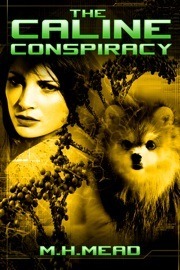 to fantasy to YA. But the books that really get our hearts thumping and our brains twirling are books about the near future. We love picturing life in the decades to come. We love imagining how current technology will change, and how society will change because of it. We love thinking about the kinds of characters who will live in that world.
to fantasy to YA. But the books that really get our hearts thumping and our brains twirling are books about the near future. We love picturing life in the decades to come. We love imagining how current technology will change, and how society will change because of it. We love thinking about the kinds of characters who will live in that world.
So, naturally, our first novel, FATE'S MIRROR, is about a super hacker in the year 2043. THE CALINE CONSPIRACY, set in the same time period, is about a private investigator trying to save a genetically engineered dog accused of killing its owner. Our books look forward to the future. In a way they also look backward, to classics by Neal Stephenson, William Gibson, and Bruce Sterling. But they're very contemporary books, with the pacing of a modern-day thriller.
So what genre are they? What are we supposed to call them? We once had a famous New York agent. He spent a couple of fruitless years submitting our manuscripts to traditional publishers. We saw the rejection letters—all of them from top-notch editors. The science fiction editors said our books "weren't science fiction enough" and the mystery/thriller editors said "we don't publish science fiction."
But here's the funny thing. Readers don't care. They want a good story, well told. They understand that genre is a marketing label that helps publishers and bookstores, but has very little to do with what interests the reader. We don't know anyone who exclusively reads a single genre and we bet you don't either. And when genres blend, we like it even more.
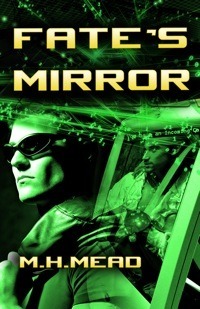 Once we became independent authors, the most unlikely demographic found our books. Our novels cross age and gender lines, but do especially well with college-educated women in generation X. Nobody knew how to market a thriller/science fiction mashup to them, but it didn't matter. Thanks to the way indie books are sold directly to readers, the people who like our kind of books could now find them. Our readers decide for themselves what to call our books when recommending them to friends—some say sci-fi, some say cyberpunk, and some even call them technological mythology.
Once we became independent authors, the most unlikely demographic found our books. Our novels cross age and gender lines, but do especially well with college-educated women in generation X. Nobody knew how to market a thriller/science fiction mashup to them, but it didn't matter. Thanks to the way indie books are sold directly to readers, the people who like our kind of books could now find them. Our readers decide for themselves what to call our books when recommending them to friends—some say sci-fi, some say cyberpunk, and some even call them technological mythology.
So, what do we call FATE'S MIRROR and THE CALINE CONSPIRACY? Sometimes we say they are "Science fiction for people who read thrillers." Sometimes we say, "They are near-future adventures." Mostly, we say, "It's a book we wrote about a hacker who saves the world" or "It's a book about a genetically engineered pet who may or may not have killed its owner." The reader doesn't really want to know what kind of book it is. He wants to know if it sounds like a book he'll enjoy reading.
If you have to slap a label on it, this is the book I would like is the very best genre label of all.
Bio:
M. H. Mead is the shared pen name of Margaret Yang and Harry R. Campion.
Margaret Yang is a writer and parent who lives in Ann Arbor, Michigan. She loves living in the modern age, and can't wait for the day when she has her own flying car. Although parenting, writing and reading fill her days, her true mission in life is to find the perfect slice of key lime pie.
Harry R. Campion is a writer, teacher, and parent who lives in Harper Woods, Michigan. He and his librarian wife are doing their part to bring up the next generation of readers. In addition to reading and writing, Harry's favorite activity is camping in remote areas, especially when he has a canoe and a river to explore.
Margaret and Harry have been friends and co-authors for many years. To learn more about them, or to read more of their stories, visit www.yangandcampion.com.
Check out the books at Smashwords, Amazon, or Barnes & Noble.
Related Posts:
Indie Writing and Traditional Storytelling with Alan Dean
Self-Publishing Tips: It's OK to Re-Issue Your First Book (by Sheryl Steines)
A Checklist for Self-Publishing by Rose Andrade
March 22, 2012
Dark Currents Audiobook Released at Podiobooks
At long last, the Dark Currents audiobook is up and running over at Podiobooks (you should be able to find it soon on iTunes too). Due to a misunderstanding on my part, and something to do with getting independent books into Audible, the entire novel is up for your listening pleasure. I'd meant to do a chapter each week, as we did with Emperor's Edge, and that might yet get changed, so if you want to grab the whole thing in one swoop, now would be the time.
If you're enjoying the audiobooks and would like to chip in a little to help fund the creation of future ones, my Kickstarter campaign still has a few days to go. You can donate as little as a dollar. Of course, if you kick in more, you can get signed paperbacks, copies of the completed audiobooks, extra scenes, and other goodies.
Thanks for the support!
Related Posts:
Emperor's Edge Updates: Audiobook Coming and New Cover Text
Fantasy Music from Around the Web
Must-Read Steampunk Books (Want to Add Yours?)
March 19, 2012
How to Improve Your Ebook Sales at Barnes & Noble, Smashwords, and iTunes
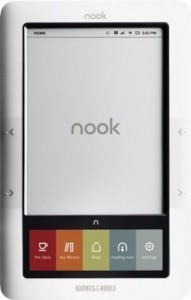 I hear a lot of independent authors say that their ebook sales at Barnes & Noble, Smashwords, iTunes, etc. are practically non-existent when compared to their Amazon sales. A lot of folks seem to have enrolled in KDP Select (which requires 90 days of exclusivity with Amazon), because it might give them a boost at Amazon, and, hey, they hardly sell any ebooks elsewhere anyway, right?
I hear a lot of independent authors say that their ebook sales at Barnes & Noble, Smashwords, iTunes, etc. are practically non-existent when compared to their Amazon sales. A lot of folks seem to have enrolled in KDP Select (which requires 90 days of exclusivity with Amazon), because it might give them a boost at Amazon, and, hey, they hardly sell any ebooks elsewhere anyway, right?
If you're happy in KDP Select and don't care that Amazon is your only source of revenue, then that's fine, but this post is for authors who get nervous at the idea of having all of their eggs in one basket and/or would like to expand their reach and have fans from all over.
Before I get further into this post, I do want to remind you that Amazon is the biggest online bookstore out there, and you'll probably always sell more ebooks there (though I've come across exceptions who sell extremely well in iTunes, for example, and aren't that hot at Amazon). For myself, I earn $X,XXX a month at Amazon and $XXX at iTunes, Smashwords, and Barnes & Noble, with B&N being my second best earner overall.
So, how do you get on the radar in those places? I'm glad you asked…
The Free Ebook
I know not everyone is keen to give an entire novel away for free (and, honestly, there's not much point, insofar as marketing goes, unless you have more out in the series, so the reader can go on to purchase those after enjoying the first), so before I jump into this, let me point out that you can make a short story into a free ebook. I'm a fan of using characters from your novel(s), so that the story works as a teaser to get folks into your world.
But I digress. Let's talk about why this works.
Right now, thanks to KDP Select, there are a gazillion free ebooks at Amazon at any given time. It used to be easy to stand out over there if you had a freebie, because there weren't that many of them, but it's harder now. This isn't as much the case in these other stores.
The main (perhaps only?) way to get a free ebook into these stores is to upload it to Smashwords, make it free there, and distribute it to the partner stores (iTunes and B&N being the most prominent). Because of the lag time (it can be hard to make an ebook free for a short time, for a "sale"), some authors just aren't willing to go the free route.
Once I made my first novel free a few months ago, my iTunes sales and B&N sales grew a lot more pronounced. As I've mentioned elsewhere, by giving Book 1 away for free, I'm making more overall, because of the increased sales of the second and third novels in the series.
The Prominently Displayed Links
I've done lots of posts talking about how to use your blog to sell more books. Once you start getting visitors to your site, you'll want to make sure it's easy for them to find your books and give them a try. You'll notice the cover art for my Book 1s (along with links to excerpts and bookstore sales pages) are prominently displayed on the side bar of every page of my site. I don't want people to have to hunt around to give my stories a try. The whole reason this blog is here is to sell my books!
I've noticed that a lot of authors only include links to Amazon on their sites, and similarly they focus their social media efforts on directing people to Amazon. You can't do that and then wonder why you don't sell anywhere else!
I try to include links to Amazon, B&N, and Smashwords at the least (and I'm starting to work in the iTunes links as well). Even though Smashwords isn't a big store, it's a great option for your international readers (no hidden taxes), and the fact that it offers every single file format out there is another plus. I've had people send me fan mail and mention that they read the pdfs of my books on their computer screens. Yes, one can do that with the free Kindle app, too, but not everyone is aware of it or would use it if they knew about it. I know it's hard to imagine, but some people just aren't interested in shopping at Amazon!
You might also try some campaigns to target these smaller stores specifically. It's a great time to do so because a lot of indies have pulled their books out of Smashwords, B&N, etc. due to the exclusivity clause in KDP Select, meaning you have that many fewer competitors in those markets.
As an example, I first started selling books at Barnes & Noble last year when I tinkered with a Goodreads advertising campaign. I made some ads that specifically targeted Nook owners and sent them to my book's sales page at B&N.
Taking Advantage of Smashwords Sales and Specials
A couple of times a year, Smashwords does big weekly sales to encourage people to try new authors. You can easily participate simply by checking a couple of boxes. I gave away over 200 copies of Encrypted last week, and sales of my non-free ebooks have been up ever since. I did a couple of tweets about the freebie, but most of those downloads came from folks Smashwords was pulling in via their marketing efforts (they were plugging their sale all over the 'net).
In other words, I didn't do anything except enroll my ebook, and I got new readers (and sales) out of the deal.
It pays to be aware of these types of opportunities. At Smashwords, you can also use their coupon generator to give away free or discount copies (for those who don't want to simply make a book free indefinitely). This can be a good way to monitor where book sales come from, since you can see when coupons are redeemed.
Those are three methods I've used to increase my sales at other stores. If you want to recommend any others, or share your experiences with smaller venues, let us know in the comments.
Related Posts:
Ebook Pricing: Why 99 Cents Might Be a Mistake for You
What Can We Learn from JA Konrath's $140,000 E-Publishing Sales Month?
Should an Indie (Self-Published) Author Create an Imprint (i.e. their own "press")?
Lindsay Buroker
- Lindsay Buroker's profile
- 6194 followers


